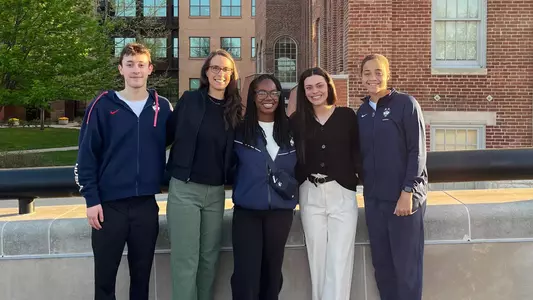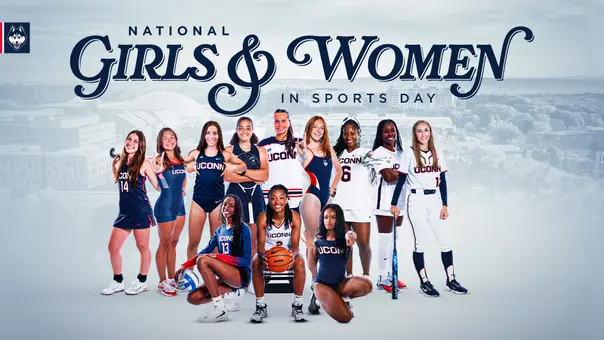University of Connecticut Athletics

5 UConn representatives find Common Ground at national office
7/28/2025 11:44:00 AM | General
At 3-day event, participants work to create a collegiate athletics model that is safe and inclusive for people of all sexual orientations, gender identities and faith perspectives
UConn student-athletes had questions that athletics graduate assistant and doctoral student Adam Gottner wanted to answer.
Gottner noticed student-athletes reflecting on the news and discussing the multiple identities they hold; many kept coming back to the intersection of religion and sexuality.
"A lot of students felt conflicted. They would ask, 'How can we be part of the LGBTQ+ and religious community because a lot of people view that as mutually exclusive?'" he said. "Or they said how people just didn't want to talk about it because those two things together made people uncomfortable."
Gottner reached out to faith leaders on campus to begin those conversations, but he still desired tools and dialogue to facilitate these conversations to serve the student-athletes.
"Then we saw Common Ground existed, and it was like, 'Wait, this is exactly what we needed.'"
Gottner assembled a group of five UConn representatives to apply for the seventh annual Common Ground, a conference hosted at the NCAA national office in April. The three-day event was guided by a vision to create a model of collegiate athletics that is safe and inclusive for people of all sexual orientations, gender identities and faith perspectives.
The UConn team joined 70 other student-athletes and athletics, academic and campus staff members from faith-based, private and public universities. Multiple representatives from each school applied to the program, allowing each campus team to discuss specific challenges, as well as campus strategies and resources.
In addition to Gottner, UConn brought Danielle DeRosa, a sport management professor; Shaliya Heard, director of softball operations; Lexi Hastings, a softball student-athlete; and Cameron Didion, a tennis student-athlete.
Changing the values of participants has never been the objective of Common Ground. Rather, the program seeks to bring together groups of individuals with varying perspectives and break down barriers through conversations that foster empathy and understanding.
"Oftentimes we operate in silos, so there'll be a bunch of people doing really cool work, and you're not even aware they're doing something similar to what you're doing," DeRosa said. "I was really excited to have the opportunity to understand from the perspective of a student-athlete or a graduate assistant on how we can work together to continue to make the experience of folks on campus not only better, but a little bit more connected across campus."
In addition to UConn-specific reflection, the event gave participants the opportunity to meet with representatives from other universities.
For Didion, Common Ground gave her the opportunity to build connections she wouldn't normally have sought out.
"It's sort of easy to put everybody in a box, and I caught myself doing that with some of the people from more religious schools," Didion reflected.
Yet in a one-on-one conversation, Didion connected with a chaplain from a religious university. Didion noted that the chaplain asked thoughtful questions that led to meaningful dialogue.
"It was sort of eye-opening for me to hear their perspective and some of their reservations, but also hear them be so respectful and kind," the student-athlete said. "It opened me up for the rest of the conference to be a little more open to talking to different people."
Hastings connected with others from a wide range of backgrounds taught her that the idea of dialogue does not have to be scary. She thought about her experiences on campus and how she could bring those tools to her peers.
"Common Ground allows for a resource for students within that intersection (of religion and the LGBTQ+ community) seeking a place for belonging. We realized that within our athletic department, a lot of student-athletes didn't know where to go for those resources. We have them. We just need to make student-athletes aware of it," Hastings said.
Near the end of the conference, UConn's group sat down and built out 30-, 60- and 90-day plans for implementing the teachings of Common Ground on campus. They brainstormed an idea to make the Common Ground curriculum a one-credit class for incoming students.
"We met with senior leadership in our athletics department to give them the idea of what the conference is about and how impactful and meaningful it was to the student-athletes," Gottner said.
Additionally, Didion and Hastings have made efforts to implement the Common Ground messages into their summer internships on campus. Didion, who is interning in the diversity, education and inclusion department, and Hastings, who is interning in the athletics department, are focusing on opportunities to share the student-athlete experience based on the lessons and themes from Common Ground.
UConn's representatives were grateful to have had the time to connect, reflect and plan on a personal and professional level.
"The two words I always come back to are transformational and magical," Gottner said. "To be in a room with people that didn't think the same way as you but had the same openness and humanness was really refreshing. You felt safe having these conversations."
For the UConn group, Common Ground served as the first step to answering some oft-talked-about questions on campus and to having the courageousness and willingness to say, "I don't know all of the answers, but I'm open to learning."
"Sport can be a vehicle for change, but we can't romanticize that. We have to be really intentional about how we use sport," DeRosa said. "I really appreciated the opportunity to use sport as a basis for connection and build from there using dialogue."
Individuals or school interested in participating in a future Common Ground program should contact Jean Merrill, director of the NCAA office of inclusion, at jlmerrill@ncaa.org.


















